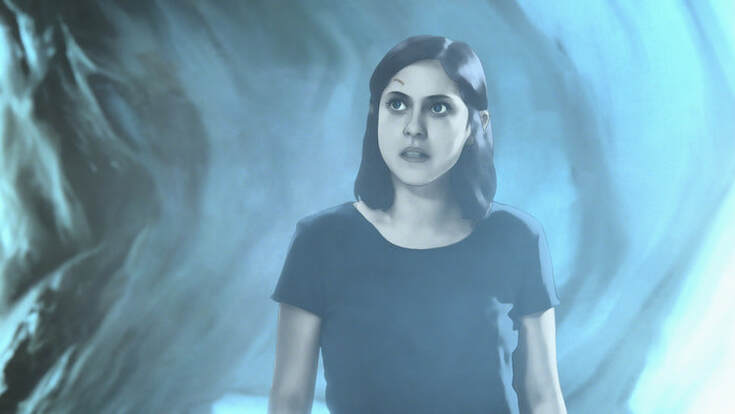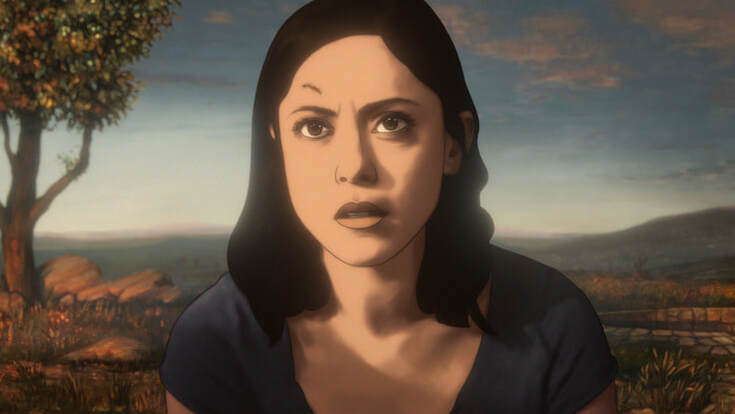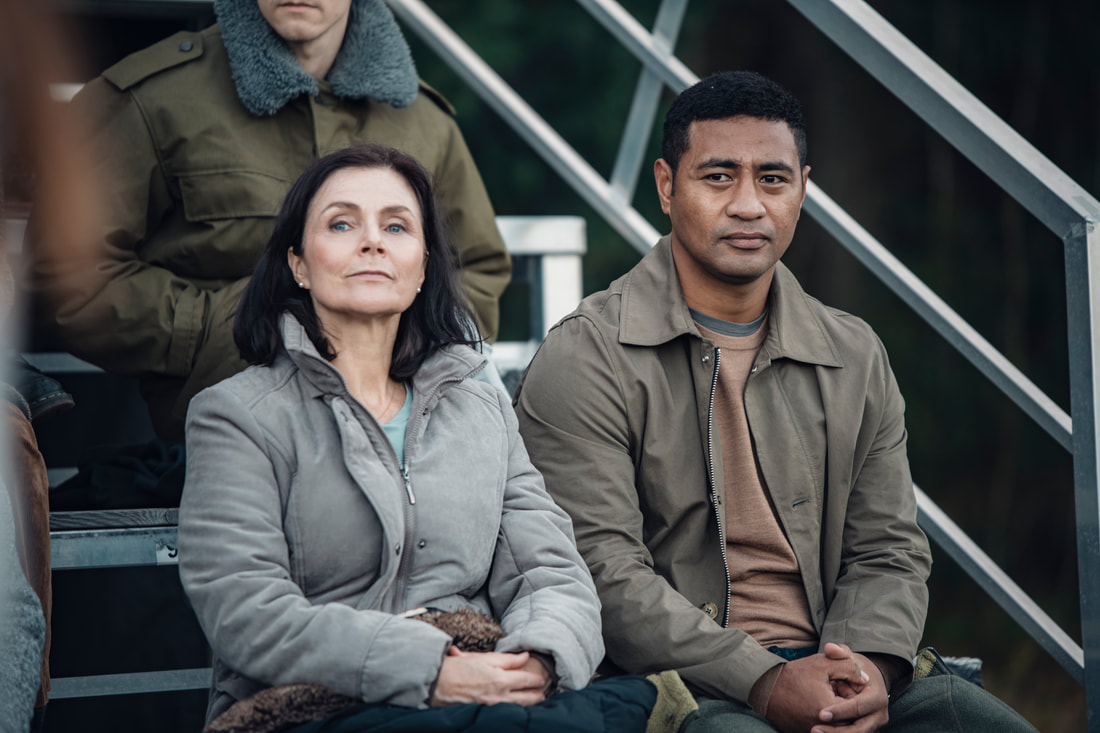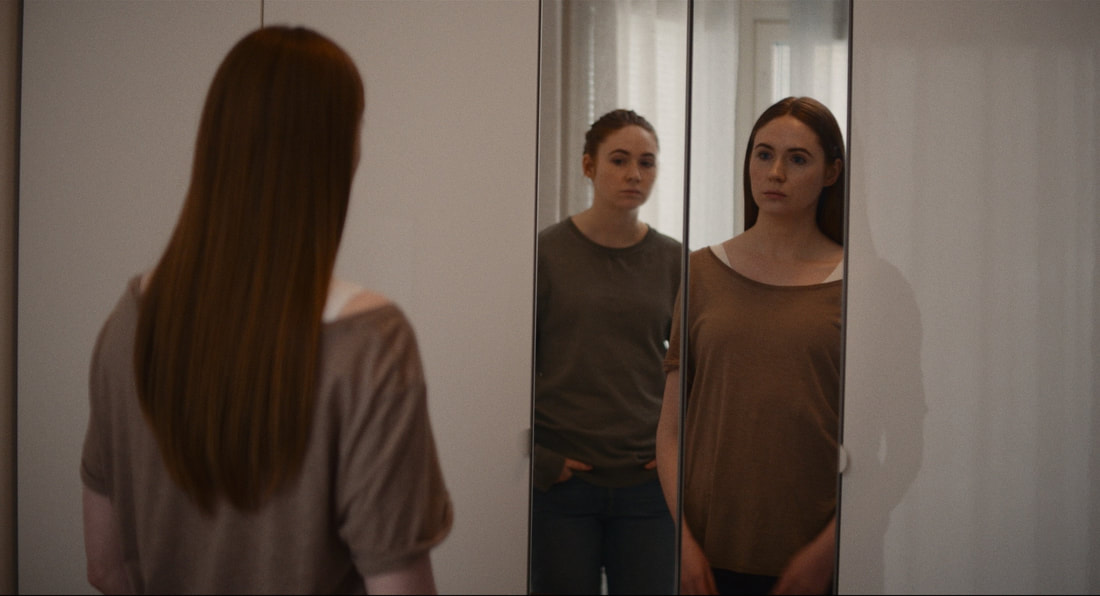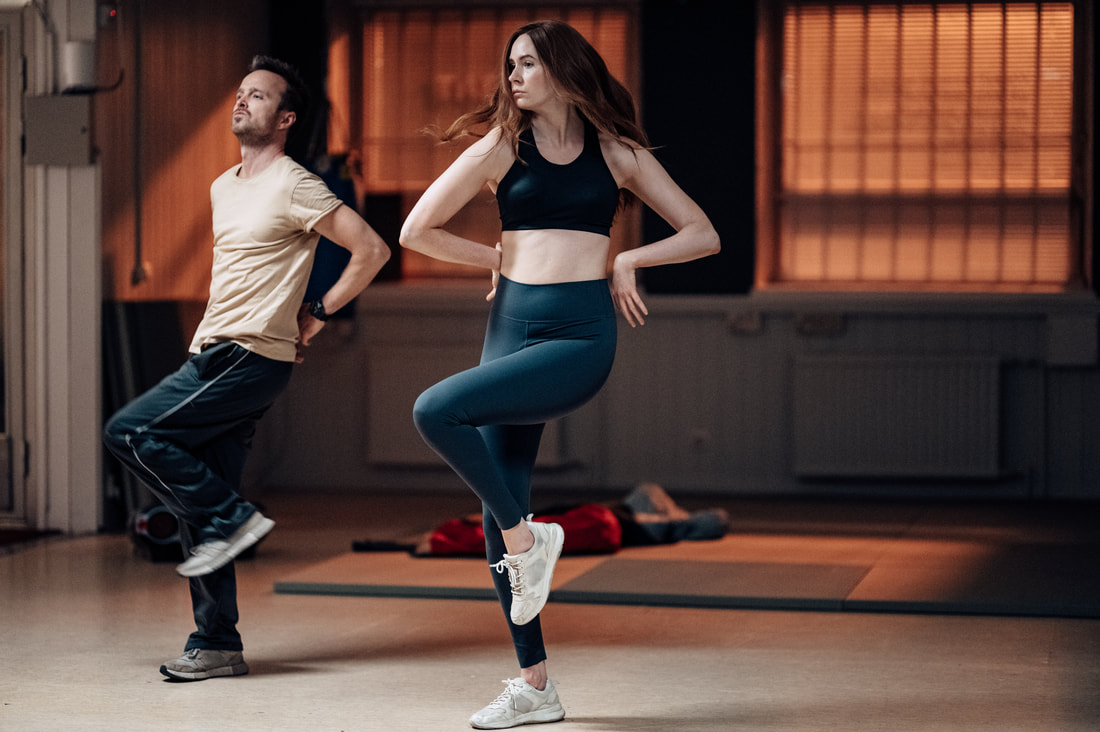|
Interview by Sean Boelman
Created by Raphael Bob-Waksberg and Kate Purdy, two of the minds behind Bojack Horseman, Undone is a fascinating sci-fi adult animation show on Prime Video. Season one posed some interesting questions, and now season two expands upon them in thought-provoking ways you wouldn’t expect.
We at disappointment media got the opportunity to talk with Rosa Salazar, lead actress and producer of season two of the show, also known for starring in fan-favorite Alita: Battle Angel. In the interview, we talk about acting for performance capture, the complex themes of the series, and more. Check it out below! On Working With Performance Capture
disappointment media: So you've done quite a bit of work at this point with motion capture performances. What about motion capture performances do you like working with?
Rosa Salazar: So Jon Landau, who produced Alita who's just like an OG producer, would kill me, if I said motion capture. [She laughs.] I'd get a stern phone call. "It's performance capture!" That's what he would yell at me on the phone. It's been drilled into my head at this point. So performance capture is what I did on Alita and rotoscope animation, I would call it also performance capture. It is more motion capture than performance capture, because they don't have two high definition cameras five inches from my face. But what I love about acting, and then grouping that work with CGI artists, rotoscope animators, and traditional animators is that I get to exist freely. Those two methods are incredibly different: performance capture for Alita and rotoscope animation, the acting is very, very, very different. For Undone, it's so amazing, because we don't have makeup touches. We don't have someone coming in and straightening out your shirt. We're not worried about the wrinkles on your shirt, or the unkemptness of your hair. We don't have a lot of wardrobe changes because it is a cartoon, after all, a cartoon closet. We wear the same thing every day. There's no major light changes. There aren't incredibly intricate camera changes. So you are totally free to exist within the moment. And with rotoscope animation, it's incredibly challenging physically, emotionally, mentally. Just to compare, on something like Alita, it's such a behemoth. It's such a slow moving beast, you have a lot of technology, people running around doing certain things, you have major changes in camera and location, and you have a lot going on. So you have a lot of downtime. Something like Undone, you have zero downtime. You never sit in your cast chair, you have a 30 minute lunch, and you go right back to work. And when you are working, you are working. On something like Alita, maybe you do an eighth of a page, four pages, and that's working with someone like Robert Rodriguez, who knows exactly what he needs, doesn't waste time. And on something like Undone, you could shoot anywhere from 10 to 20 pages a day. So on any given day, you can go on an emotional roller coaster of breaking up with your boyfriend, seeing your dead father, having a falling out with your sister, having a falling out with your mother, getting into a car accident, seeing the expanse of the universe, all in one workday. When you go to your job, do you have to do such a crazy emotional upheaval day after day after day? I mean, it's incredibly challenging. And because we have no downtime, you are working at a rapid clip. So that's what I love about it. I love that it's uninterrupted. So you're really in the flow, and you really get to this meditative state with it, and it's just divine. disappointment: So in interviews for season one, you talked about some of the challenges of shooting that performance capture type performance in the rooms of green screens. Was it any easier or different to approach Season Two after having the experience of season one under your belt? Salazar: Yes, it was different. So Hisko Hulsing, who is the amazing director behind Undone, puts it the best way. He's like, "Season one, it was like no one really knew what we were doing yet. We were building a car while learning to drive it." And then it came out, it was very special. We're like, "Okay, we got this!' And then season two, he's like, "Man, now we have a Maserati. Let's put the top down and put it on cruise control!" And then the pandemic hit. So we had to, you know, build a new car. So It was different doing season two, even though we had all of this intelligence that we accrued from doing season one, we had to bob and weave with the changing landscape of time. We had to be fluid, but that is the nature of Undone is sort of learning how to drive the car while you're building it anyway. So even the education in doing that, and doing the unknown really dovetails nicely into the work itself. Now with COVID and season two, things changed dramatically. We were stripped down from like 20 people on set to around six to eight people on set. We had just the actors, the cameraman, our AD, Patrick Metcalf. All of our producers and our directors and our animators were on Zoom. We had our COVID Officer, Ron — shout out to Ron, he was awesome. And that was it. And it was me and Angelique [Cabral] mainly on the set, just us and so it created a more intimate vibe, and honestly, I think, more efficient vibe. Because you don't have people walking in and out of the room. It was like a pressure cooker. But having done season one, we could do season two, had we not done season one? I'm sure we could have pulled it off, but it would have been a lot more of an endeavor. On How This Season Takes The Show Further
disappointment: You mentioned the intimacy, I really felt this in the new season, how it kind of expands upon these themes that are very tender themes like mental health, generational trauma. Why do you think it's important for these themes to be discussed in projects like this?
Salazar: Catharsis. That's why it's important: catharsis. Very plainly put, to tell other people that you are not alone, that this is a human condition. And we take it a step further and say, even if you could go back in time, yesterday, last month, three years ago, all the way back to, let's say, my father's father's father, an indigenous man in Peru, and you could go all the way back, the same problems would persist. It is a human condition, no matter how far back, no matter the context, no matter the time period. It's important to remind people that we're human, that we're fallible, that we have secrets, that we make decisions, that we make choices and our choices, whether the intention is good, or what have you, those are choices that are made for a reason. And I think it's important to talk about things like choices because people spend a lot of time and regret, and shame and guilt. And I think it's important to highlight that we're all just doing our damn best out here. And when we talk about things like mental illness, I think it's incredibly important. Look at the way we talk about Kanye West. Look at the horrible way we talk about a man who is openly unwell. We call him crazy, we call him insane, then we will turn around call him a genius and the greatest of all time, but then we make fun of him for having very public mental breakdowns. The conversation, I can't believe it, is just beginning around mental health, mental illness, and it's just really, really important that we discuss it in general. I can't believe it still has a taboo around it when most of us suffer. And I think it's important to show a character like this, who is mixed race, who is a woman dealing with some sort of behavioral illness. I mean, we're still on the fence, right? Is she unwell or does she have shamanic abilities? We're still asking that question and to me, in my opinion, It's somewhere in the middle, like it's a combination of the two. I love that Undone forces these questions. Maybe you can't have one without the other. We talk about Kanye again. Maybe you can't have this genius without some level of like, if you can perceive so much more, if you can see more and feel more, then wouldn't that lend itself to a creative brain? Or can we be well and still have this magic? And I think we're still scratching the surface of that question, not even the answer in Undone. And that's what I love about it. And that's why it's so important, because it really isn't about answering the question. It isn't really isn't about being like, "And this is mental illness, educationally." It's more about being curious. disappointment: So for season two, you also served as a producer on Undone. What kind of inspired you to take this step into being a producer in addition to starring in the show for the second season? Salazar: Well, I think speaking of representation, I think it's incredibly important when you have a Latin female lead of a show going into its second season, knowing all of the work that you already put in as the lead of a show, to get recognition for that was a huge boon for me. And also just mad respect for Amazon, mad respect for Tornante, and all of the producers in the team for recognizing the hard work that leads of a show do. I mean, you are the anchor to the ship, and as a lead, you are already doing so much. So it was a big, big sign of respect from Amazon, and I can't thank them enough for recognizing that work and for really putting their money where their mouth is, and being like, here's someone we absolutely respect, who does great work for us. I do go above and beyond and they're like, "And you should be recognized for that." So it was really Amazon who did that. I may be freelance as an actor, but I'm not someone who just rocks into work and is like, "Hey, what's up," like, I really throw my entire self and body into it. And so that was really Amazon, recognizing that and saying, "You deserve this." And it's incredibly important to, to represent that. this is totally off, you know, topic, but when I was watching Only Murders in the Building, to see executive producer Selena Gomez made me cry every time. I mean, it's incredibly important. And it affects me and I'm in this business working at a high level and when I see that, I get really inspired.
Season 2 of Undone streams on Amazon Prime beginning April 29.
0 Comments
Interview by Sean Boelman
Filmmaker Riley Stearns’s follow-up to the critically-acclaimed dark comedy The Art of Self-Defense, the sci-fi comedy Dual debuted at this year’s Sundance film festival. It stars Karen Gillan as a woman who has a double made of herself when she is diagnosed with a terminal illness, only for her to make a miraculous recovery and have to fight her clone in a duel to the death to determine which of them gets to continue to live.
New Zealander actor Beulah Koale (Hawaii Five-O) co-stars in the film as the boyfriend of Gillan’s characters, getting some unexpectedly hilarious moments to play with. We at disappointment media got the opportunity to talk with Koale about his role in the film and what he would do if he found himself in Stearns’s uncanny sci-fi world. On What Drew Him to Dual
disappointment: So Dual is your first major foray into the sci-fi genre. I mean, you could kind of count Shadow in the Cloud, but that's set more in the past, versus this is like in the near future. What drew you to the sci-fi genre?
Koale: What drew me is mainly fear. Because I'm not very comfortable in that genre, or comedy genre as well. So yeah, when I'm scared of something, I always run towards it. It's a rule that I have for myself. So that's what initially drew me to work towards it. And then seeing that Riley [Stearns] was doing it and seeing his films from before, I was super attracted to that. I wanted to work with him because he has a very particular way of seeing the world through his eyes and only he can do it. That style that Riley has, it's very Riley Stearns, it was a challenge in itself. A great challenge disappointment: You mentioned how it's also a deadpan comedy. What do you think was the challenge and also the reward of dealing with this deadpan style of humor in the script? Koale: Yeah, it is both a challenge and reward because it's kinda like walking into a new dojo, turning up to the Master's house and learning a new technique. And the tricks that I learned from the other directors don't really work here — it doesn't work at all. And Riley, puts you in a very vulnerable place. Because you think you have it all figured out, then you turn up to this and you're like, "Nah, man, none of those tricks work. Just say the words and connect with the other actor." And it was such a great experience, just being in that vulnerable spot. Every time he called cut, I wouldn't know how to feel. Like I felt like it went well. But then I also didn't know because I wasn't used to it, so I just looked over to the monitor and was like, "Was that it?" And Riley would be like "Perfect. That's it," and I was like, "Okay man." On the World of Dual
disappointment: If you found yourself in a situation where you were terminally ill, would you want to have a double of yourself?
Koale: I probably wouldn't. Because I feel like I'd suffer from a very severe case of FOMO, even if I'm dead. Like, imagine being on your deathbed looking up and your family standing over you crying while your clone is standing there behind you like, "Yeah, come on, buddy. Can't wait for you to go." It would be weird. disappointment: But say that you did make a miraculous recovery like Karen Gillan's character does in the film, and you had to do a duel to the death. What weapon do you think you would choose? Koale: I would love to just like fight him with my bare hands. Fight myself, and just be like, "Alright, buddy, let's just stand in the middle of the field and see who wins." You know, that would be my most preferred option. I think the audience would love it. Like, isn't it crazy in that world, that's just like another Saturday night football match? You know, just like everyone's in the audience, "Oh, here we go. Another fight to the death. Let's see how it goes." I feel like I would bring some excitement. You know, we're using no weapons and just see who wins in the end? disappointment: Yeah, I think that would be fun in a kind-of macabre way. Koale: Yeah, it's pretty dark. [He laughs.] On Making Dual
disappointment: You co-star in the film with Karen Gillan, who's obviously great in the film, but she's basically giving two distinct performances. What was it like acting alongside someone who was doing that, with two sides?
Koale: Yeah, for me, it was very easy because I just had to act against what felt like two different people. For Karen. It was great to like, being on the outside watching her trying to figure it out. Because when she was acting opposite herself, she had to know how she was going to react to herself. So she had to have it pre-planned. So it was very interesting watching from the outside, watching Karen figure this out and logistically work it all out. But, man, I just love acting. So it just meant I got to have twice the fun in one film. disappointment: So what would you say was your favorite scene that you had in the film? Koale: The favorite scene for me personally from the film is definitely that Aaron Paul and Karen Gillan dance-off. When they do that little dance routine, that destroys me every time. Favorite one to shoot... There's a particular scene where me and Karen are sitting down at a diner and I'm apologizing to her, you know, for kind of taking sides of the other Sarah. And in the background, you see the trees going. And we didn't have a wind machine, but when all the chaos in the words, and what's happening, in the subtext, you see the trees just start going crazy in the background, and I was like, "Whoa, that's art. That's why I do this job right there when you get those magic moments.” disappointment: I think that one of my favorite scenes that you had in the film was the scene after you are with Sarah's double at Sarah's mom's house and then you guys go outside and have that argument. How many takes did it take for you to nail the inflection joke? Koale: It took me a couple, man. It took me a couple of takes because, you know, I didn't know how to do it. And Riley was kind of like, teaching us and I was like, "Just say it how you want it to be said, dude." And you know, I can't do exactly what Riley does, because I'm me as well. So it did take me a couple. But I know that line, it always gets me, "She says, 'Peter,' [higher] and you say 'Peter,' [lower]," It kills you because it's true as well. You know, when someone says your name in a particular way, it hits you differently. Like, "I liked that. I liked the way you say my name." disappointment: This film as a whole is definitely a lot less serious than a lot of other films and shows that you have appeared in the past. Did you approach this differently than some of your more serious performances? Koale: I approach all films exactly the same with a clean slate, and then I figure it out from when I start prepping. And yeah, this film in particular, I had to put a lot of trust in Riley because he knew what he wanted. So I trusted that the advice he was giving me was what was right for the film, which, you know, was right because the thing went to Sundance and it's a great film. And if anything, I took away a new bag of tricks for myself. And you know, I enjoy this comedy deadpan world, you know. I was scared of it initially, but now, I hope to do more of it. Because there's so much more that you can find in comedy, that type of comedy that you can hide things under and I feel more vulnerable and doing comedy sci-fi than doing a drama in a weird way.
Dual is now in theaters and streams on AMC+ beginning May 20.
|
Archives
March 2024
Authors
All
|
|
|
disappointment media
Dedicated to unique and diverse perspectives on cinema! |

